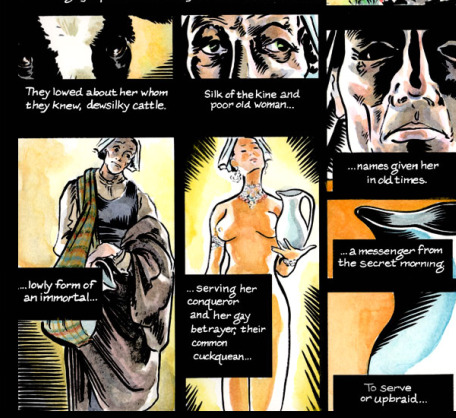Apple continues to run amok censoring iPad/iPhone apps, now forcing changes to a graphic novel version of James Joyce’s Ulysses.
As Sarah Weinman of Daily Finance points out:
Apple Censors ‘Ulysses’ Webcomic, Fails to See Irony of Situation
Ulysses, recall, was famously banned from the U.S. for more than a decade for obscenity. That was the 1920’s.
I agree with Kevin Kelleher of The Big Money that this is aptly called censorship. The second biggest (by market cap) independent company in the world censored a graphic novel version of James Joyce’s Ulysses.
The argument that Apple can do what it wants (see the pro-Apple commenters on my post from April) is complicated by its enormous influence. This is the second-biggest independent corporation in the world by market cap. It’s on track to make more than $12 billion this year and take in revenue well above $50 billion. The latter is more than the annual GDP of all but seventy or so countries.
Its influence is now playing out in how artists decide to make art. Kelleher talks to the censored cartoonists’ attorney:
Rutkowski told me that Apple didn’t ban Ulysses Seen, but asked that an image with nudity be removed from the app before it was included in the App Store, and that Throwaway Horse complied…
The panel Apple objected to contrasts the image of an old woman with a young goddess. You can see the goddess’ breasts, although they are drawn in a way that is hardly lurid or titillating.
The authors of Ulysses Seen changed that image, and cropped or edited another six, including the image of Buck Mulligan jumping into the ocean, Rutkowski said. Then Apple allowed the app into its iPad App Store. Although he felt that “nobody in their right mind is going to be titillated by this stuff,” Rutkowski sensed that there was no room for negotiation. “It was a take it or leave it kind of thing,” he said, “I got the sense there wasn’t a lot of room for bargaining.”
Kelleher says that this is evidence of Apple’s chilling effect, and there’s no doubt that’s the case. Here’s the artist, Robert Berry, on his website (which the iPad can access unrestrained, it should be noted) explaining why he changed his illustration to suit Steve Job’s prudery:
Thanks for that, and it’s distressing for myself as well to water down work that I felt was the best way to represent the novel in this new form on the iPad. But the the tablet is something I always planned for as a viewing platform for this project and, currently, Apple’s iPad is the only viable tablet around. So they do get to set the guidelines on what kind of products they want to offer there at this time.
Porn is one thing, but it’s astonishing that Apple and Steve “Think Different” Jobs would object to this picture, especially in the context of Ulysses:
“While the first chapter of the book, the one now at iTunes, doesn’t contain ‘offensive language,‘ our comic does have frank nudity. Something we figured we might have to pixelate or cover with ‘fig leaves,’” Berry notes. “But Apple’s policy prohibits even that. So we were forced to either scrap the idea of moving to the tablet with Apple or re-design our pages.”
Now, remember, here is what the press is submitting to when it asks Apple to approve an iPad app:
Applications may be rejected if they contain content or materials of any kind (text, graphics, images, photographs, sounds, etc.) that in Apple’s reasonable judgement may be found objectionable, for example, materials that may be considered obscene, pornographic, or defamatory.”
Publishers need to insist that they get free license from Apple to publish what they see fit on their apps. As I’ve written before, “the point is that if the iPad proves to be a big success for revenue-shedding publishers, Apple will have a huge amount of leverage over the industry.”
The iPad is indeed shaping up to be a significant revenue stream for the news media. The press should make sure while it can that it—not Apple—has ultimate control over what it publishes.
— Further Reading:
Wired: IPad Apps Could Put Apple in Charge of the News.
It’s Time for the Press to Push Back Against Apple: Yank iPad apps unless Apple cedes complete control over the right to publish
Apple’s Speech Policies Should Still Worry the Press
Ryan Chittum is a former Wall Street Journal reporter, and deputy editor of The Audit, CJR’s business section. If you see notable business journalism, give him a heads-up at rc2538@columbia.edu. Follow him on Twitter at @ryanchittum.

